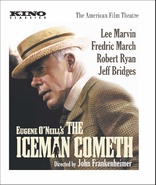The Iceman Cometh Blu-ray Movie
HomeThe Iceman Cometh Blu-ray Movie 
Kino Lorber | 1973 | 1 Movie, 2 Cuts | 239 min | Rated PG | Mar 26, 2019Movie rating
6.9 | / 10 |
Blu-ray rating
| Users | 0.0 | |
| Reviewer | 4.0 | |
| Overall | 4.0 |
Overview
The Iceman Cometh (1973)
In the faded light of Harry Hope's 1912 New York skid row bar, a rag tag group of fallen men, each like a ghost haunting the wreckage of his own life, await the annual arrival of Hickey (Lee Marvin). This year, however, the charismatic Hickey brings not the usual rounds of drinks and pats on the back, but the unwelcome news that he's off the sauce for good and has come to persuade Hope's drunks to do the same. One by one, the regulars' booz-basted pipe dreams come under Hickey's leering microscope until finally the most shocking self-deception turns out to be Hickey's own.
Starring: Lee Marvin, Fredric March, Robert Ryan (I), Jeff Bridges, Bradford DillmanDirector: John Frankenheimer
| Drama | 100% |
Specifications
Video
Video codec: MPEG-4 AVC
Video resolution: 1080p
Aspect ratio: 1.84:1
Original aspect ratio: 1.85:1
Audio
English: LPCM 2.0
English: DTS 2.0
LPCM 3 hour cut; DTS 4 hour cut
Subtitles
English SDH
Discs
Blu-ray Disc
Two-disc set (2 BDs)
Playback
Region A (B, C untested)
Review
Rating summary
| Movie | 4.5 | |
| Video | 3.0 | |
| Audio | 3.5 | |
| Extras | 1.0 | |
| Overall | 4.0 |
The Iceman Cometh Blu-ray Movie Review
Reviewed by Jeffrey Kauffman May 18, 2019Eugene O’Neill’s plays are not for the faint of heart. In addition to the often roiling, even devastating, emotional content O’Neill proffers in his work, there’s a perhaps more “mundane” aspect to many of them that may provide a hurdle for some prospective audience members — their length. Those may be two reasons why many film adaptations of O’Neill plays have failed to really connect strongly with audiences (or perhaps more accurately, translate into massive box office receipts), despite the fact that virtually every film based on an O’Neill play has made manifest changes to the source material, including at times fairly dramatic (no pun intended) shearing of text in order to get running times down to something most film audiences would consider “normal”. In that regard, Ely Landau’s visionary American Film Theatre subscription series (more about that a bit later) didn’t have to worry about exhibitors balking at an unduly long running time (the annals of the film business are filled with anecdotes of theater owners revolting when what they considered “overly long” films kept their daily showing numbers down, since they couldn’t automatically screen films every two hours or so). That was because Landau’s concept was itself rather revolutionary, offering a subscription series for “high minded” patrons where notable plays would be presented in a handful of showings in a carefully selected set of movie houses which contracted with Landau to (typically) show the films on a single Monday and/or Tuesday, days (and/or nights) when audience numbers for “regular” films were usually fairly small.
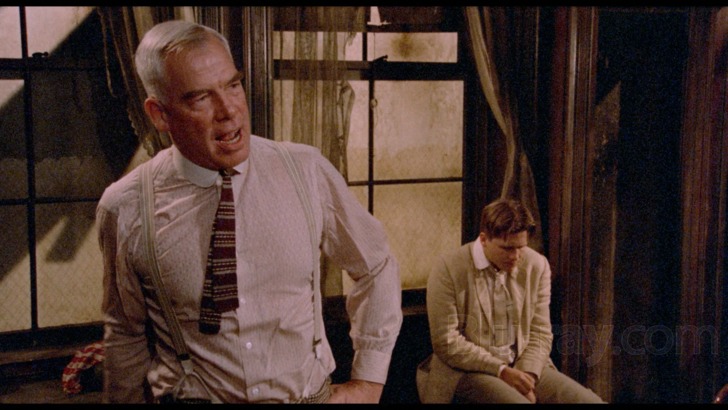
As Edie Landau relates in an engaging interview included on this two disc set as a supplement, she and her husband had already flirted with a "repertory" broadcast strategy when they produced a show called The Play of the Week for what ultimately became New York's Public Broadcasting affiliate, Channel 13. That experience, combined with another learning curve the Landaus encountered when they booked their lengthy documentary King: A Filmed Record... Montgomery to Memphis into theaters (for a special "one night only" screening), led to their brainstorm of offering a subscription series to various film versions of plays (and in a couple of cases, musicals), and thus the American Film Theatre was born. Several logistical issues ensued (as Edie Landau kind of humorously relates), and unfortunately despite attracting around half a million subscribers for their first season, American Film Theatre folded after its second year (the Landaus evidently sued some of the major studios who started balking about movie houses booking AFT offerings). Kino Lorber released the AFT offerings on DVD several years ago (I was thrilled to purchase them, having wondered about them for years), and they've been cropping up on Blu-ray now, hopefully bringing these generally extremely commendable productions to a new audience.
There’s perhaps an unintentional irony in the fact that American Film Theatre chose The Iceman Cometh as it inaugural offering of its first season, at least given a comment by Edie Landau in the aforementioned supplemental interview. She discusses how the Landaus got the considerable corporate backing of American Express for the project (they’re listed as a “co-presenter” in this film’s opening credits), because both the Landaus and American Express felt simpatico in fighting what Landau terms “the pollution of the mind”. The irony here is, as any student of the play will no doubt know, that The Iceman Cometh in a very real way is about nothing other than “the pollution of the mind”, whether those pollutants be “exterior” influences like alcohol, or more psychological aspects like self-delusions. (Ely Landau had had some experience bringing O'Neill to the big screen, having co-produced the well regarded 1962 version of Long Day's Journey Into Night.)
In a bar that frankly seems like a bit of a retread from O’Neill’s Anna Christie , a ragtag group of drunks are in “session”, waiting for the arrival of regular visitor Hickey (Lee Marvin). Suffice it to say that the habitues of this bar owned by the perhaps intentionally "misnamed" Harry Hope (Frederic March) are a virtual litany of washed up “lives”, and Hickey’s drop bys are about the only excitement anyone in the place can look forward to. When Hickey does arrive, his announcement that he’s “on the wagon” leads to a series of reassessments and revelations, all within the often florid emotionalism that is the foundation of many O’Neill plays.
This is an often riveting production that creates a palpable feeling of listlessness and downright claustrophobia. While Marvin is a force of nature as Hickey, he’s also kind of surprisingly low key at times, something that gives his performance an undeniable gravitas. Robert Ryan, as Larry Slade, one of what might be termed O'Neill's “politically” motivated characters, is also very impressive. I personally was a little less taken by the “youngsters” in the cast, namely Bradford Dillman and Jeff Bridges, but the overall production, despite quite a few changes from the original, manages to capture the unsettling spirit of O’Neill as very few film adaptations that I’ve personally seen have.
The Iceman Cometh Blu-ray Movie, Video Quality 
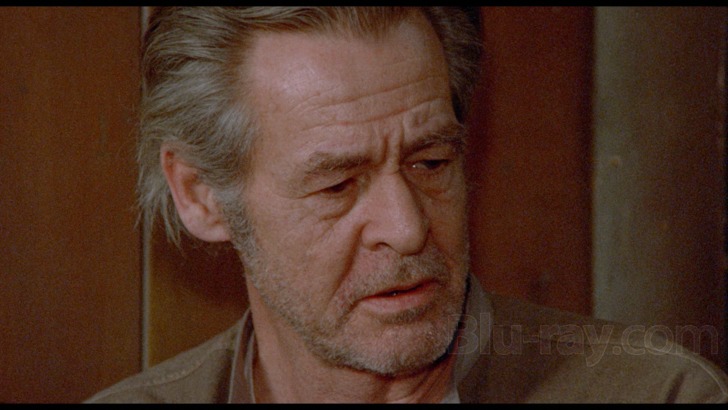
The Iceman Cometh is presented on Blu-ray courtesy of Kino Lorber's Kino Classics imprint in two versions with AVC encoded 1080p transfers (mostly) in 1.84:1. Kino is touting "new 2k restoration(s)" for both versions, but there are some issues that videophiles may want to keep in mind. This is definitely an upgrade over the DVD version, but my personal recommendation is to temper expectations somewhat, something I've purposefully hoped to help along with a mid-range video score. While director John Frankenheimer, a veteran of live television dramas, wisely utilizes a lot of close- ups and midrange shots, two strategies that help to support at least decent detail levels, this production's visual allure is perhaps hobbled by an often dark ambience and what is often a very heavy grain field. In fact the grain is so heavy that it clumps and looks positively chunky a lot of the time, with a somewhat pixellated appearance that can veer from blue to yellow. The gritty grain is most apparent in the many dark or dimly lit scenes, and for one reason or the other tends to be most noticeable toward the bottom of the frame a lot of the time. While the palette never really "pops" in any meaningful way, there's a good accounting of what is often an emphasis on browns and yellows in the production design. I've tried to provide a variety of screenshots showing these tendencies, though I'd say this looks at least somewhat better in motion than some of the screenshots may indicate. Screenshots 1-15 are from the three hour version, while screenshots 16-19 are from the longer "director's cut", and those screenshots may indicate another potential problem for some viewers: the longer version is obviously cobbled together from at least two different source elements, with the "additional" scenes from what I have to assume is a secondary (or frankly tertiary or beyond) element that is in a different aspect ratio and, while to my eyes still sourced from film, has a somewhat "video-esque" appearance. Grain is much less pronounced in the "additional" material, and so ironically may be more palatable for some viewers. However, color timing and contrast are often radically different from the bulk of the film, and even within the "additional" scenes, there are fairly wide variances (pay attention at around 42:30 when color and contrast go a bit haywire in the middle of an additional sequence, looking almost desaturated and blown out for a moment).
The Iceman Cometh Blu-ray Movie, Audio Quality 
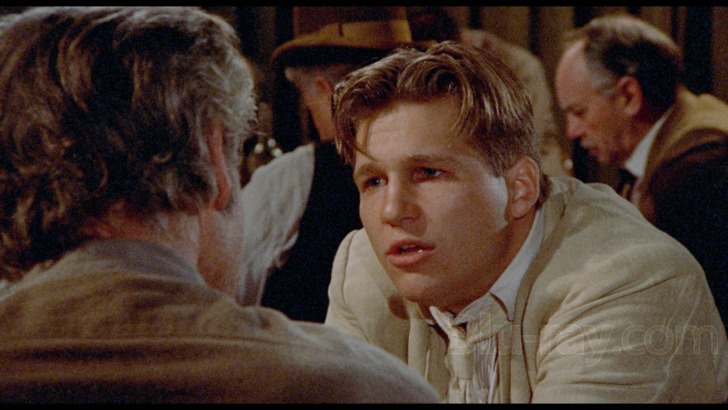
The four hour director's cut features a DTS 2.0 soundtrack, while the three hour theatrical version features an LPCM 2.0 track. Clarity and amplitude are arguably a bit better and/or forceful on the LPCM 2.0 track, though anomalies like a rather loud pop at the beginning of the film and continuing (if relatively minor) pops, cracks and rustling noises (kind of like aficionados of old style long playing records may be used to hearing when a stylus hits vinyl) pretty continually accrue throughout the presentation. There are some stumbles in the director's cut as the soundtrack segues from the theatrical version to the "additional" elements, often with small pops in attendance and some fluctuations in amplitude. All of this said, O'Neill's memorable dialogue makes it through the gauntlet well enough, and despite these hurdles, there isn't a ton to complain about given reasonable expectations.
The Iceman Cometh Blu-ray Movie, Special Features and Extras 
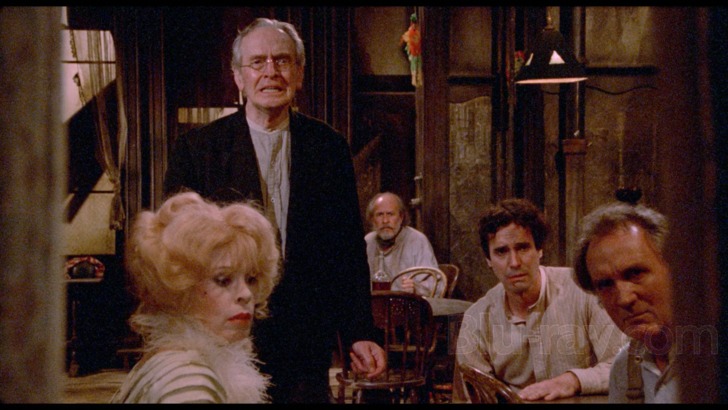
Disc One
- Four Hour Director's Cut (1080p; 3:59:00)
- Three Hour Theatrical Cut (1080p; 2:58:13)
- Interview with Edie Landau (1080i; 26:16) is an extremely engaging sit down with Ely Landau's widow, with both general background information on their producing careers as well as some fun anecdotes about American Film Theatre's relatively brief existence.
- Ely Landau: In Front of the Camera (1080i; 6:30) is a perhaps unintentionally funny promotional piece that Landau evidently filmed to show subscribers at the end of the first season. Let's just say that it's obvious what a showman Landau was from even this brief piece.
- AFT Trailers
- Butley (1080i; 2:58)
- A Delicate Balance (1080i; 3:25)
- Galileo (1080i; 3:30)
- The Homecoming (1080i; 2:36)
- The Iceman Cometh (1080i; 2:38)
- Jacques Brel is Alive and Well. . . (1080i; 3:26)
- Lost in the Stars (1080i; 2:10)
- Luther (1080i; 2:31)
- The Maids (1080i; 3:06)
- The Man in the Glass Booth (1080i; 2:44)
- Rhinoceros (1080i; 1:55)
- Three Sisters (1080i; 2:43)
The Iceman Cometh Blu-ray Movie, Overall Score and Recommendation 
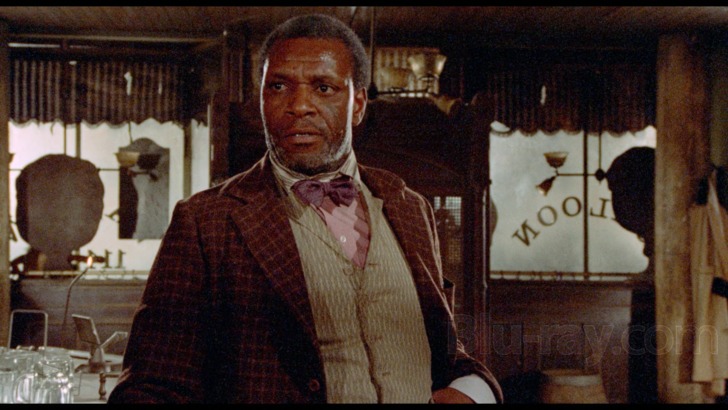
The American Dream as self-delusion haunts The Iceman Cometh, and the film's political subtexts are often as interesting as some of the more personal, psychological aspects. This is a towering production brilliantly directed by John Frankenheimer and featuring a glut of really visceral performances, especially by some of the more "seasoned" actors. Video and audio both encounter some hurdles along the way, for those considering a purchase. Those caveats aside, Recommended.
Similar titles
Similar titles you might also like

A Raisin in the Sun
1961

Blaze
2018

Wonder Wheel
2017

The Master
2012

Little Caesar
1931

The Lost Weekend
1945

Thelma & Louise 4K
1991

Days of Heaven 4K
1978

Hill Street Blues: Complete Series - Seasons 1 - 7
1981-1987

Wake in Fright
1971

Opening Night
1977

Medium Cool
1969

Mr. Selfridge: Season 4
2015

Under the Volcano
1984

A Master Builder
2013

Blonde Venus
1932

3 Women
1977

The Power of the Dog
2021

Amira & Sam
2015

An Autumn Afternoon
秋刀魚の味
1962
